Advertisement

- Updated on May 15, 2025
- IST 7:37 am
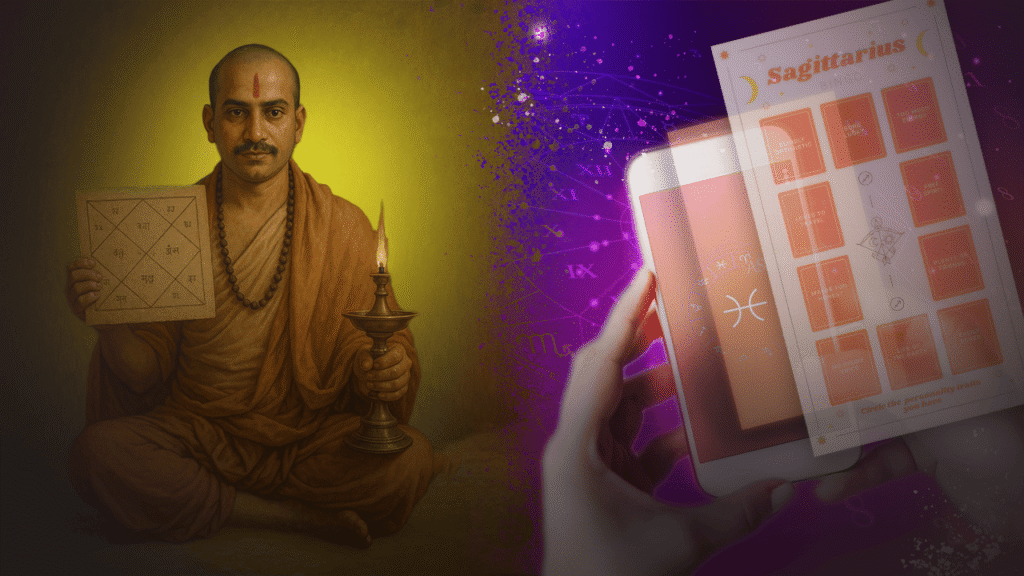
Imagine sitting cross-legged in a dimly lit room, the air heavy with the scent of sandalwood incense, as a pandit with a furrowed brow studies your birth chart, his fingers tracing the celestial lines that map your destiny. Now, picture yourself crammed into a bustling Mumbai local train, phone in hand, as an AI-powered app decodes your future with a few quick taps. Two worlds—one rooted in centuries of tradition, the other fueled by cutting-edge technology—collide in a cosmic clash that’s sparking debates across India. Your birth chart, decoded by AI: Will algorithms kill India’s astrology industry? Let’s dive into this fascinating face-off between pandits and pixels, exploring whether artificial intelligence can outshine the wisdom of tradition.
The Pandit’s Way: Astrology as India’s Cultural Heartbeat
Astrology in India isn’t just a practice—it’s a way of life. Known as Jyotish, or the “science of light,” it’s been a guiding force since the days of the Vedas, over 3,000 years ago. Pandits, the custodians of this ancient knowledge, interpret the positions of planets and stars to offer insights into everything from marriage dates to career moves. For generations, they’ve been the go-to advisors for life’s big moments—naming a newborn, launching a business, or even deciding when to tie the knot. In fact, a 2023 survey by the Indian Cultural Research Institute found that 68% of Indians still consult astrologers for major decisions.
Take my uncle, for instance. When he bought his first car—a shiny Maruti 800—he wouldn’t dream of driving it home until the pandit performed a puja on an auspicious day. That’s the power of tradition: it’s personal, emotional, and deeply ingrained. Pandits don’t just read charts; they read people, offering counsel that blends celestial wisdom with human empathy. “Astrology is an art,” says Pandit Gopal, a third-generation astrologer from Varanasi. “It’s not just about numbers—it’s about understanding a person’s soul.”
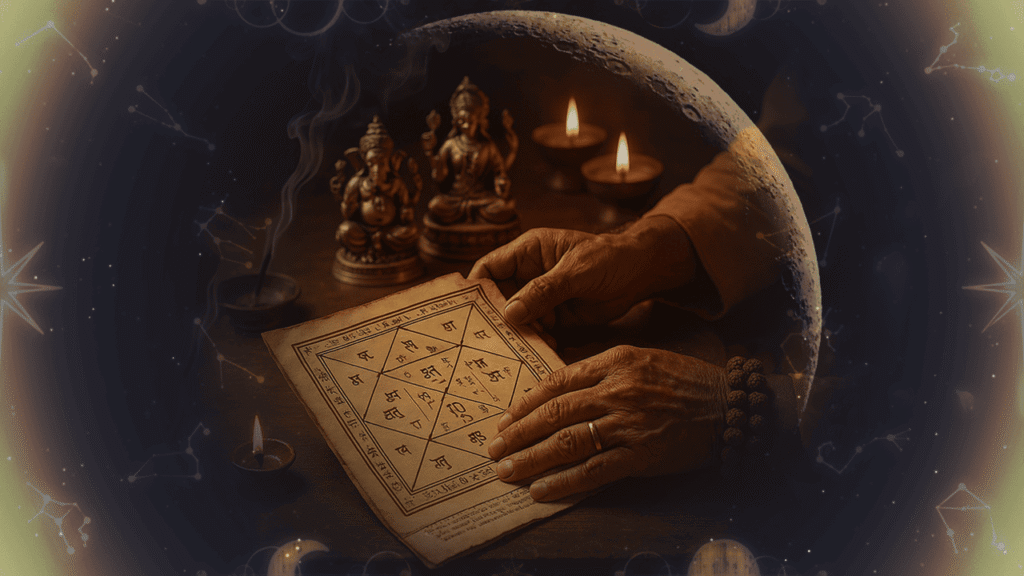
Enter AI: The Rise of Cosmic Algorithms
But the stars are shifting, and technology is stepping in. Startups like AstroSage and Astroyogi are shaking up the astrology scene with AI astrology apps that promise personalized horoscopes at your fingertips. How do they work? Simple: you input your birth details—date, time, and place—and sophisticated algorithms crunch the numbers to generate predictions in seconds. No incense, no waiting, no handwritten charts—just instant cosmic clarity.
These apps use machine learning to analyze vast datasets, from historical astrological patterns to user behavior. If you’re a Scorpio who keeps checking career forecasts, the app might nudge your horoscope toward job-related advice. It’s fast, affordable (many are free or low-cost), and accessible—whether you’re in a remote village or a metro city, your future is a swipe away. According to a 2024 TechIndia report, India’s spiritual tech sector, including astrology apps, is growing at 20% annually and could hit ₹5,000 crore by 2025. That’s a cosmic cash cow fueled by a tech-savvy generation.
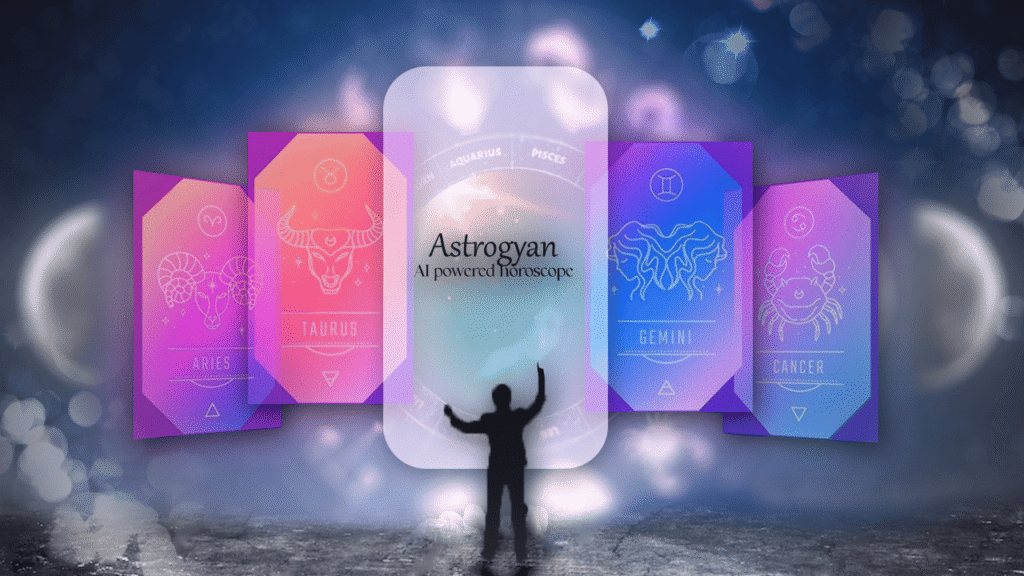
The Great Debate: Pandits vs. Pixels
So, who does it better—pandits or AI? Let’s break it down.
The Case for Tradition
Traditional astrologers argue that their craft is irreplaceable. “A machine can’t feel your pain or sense your hopes,” says Pandit Verma from Jaipur. “Astrology is like playing a sitar—its music comes from the soul, not a synthesizer.” Pandits offer a human touch that apps can’t replicate. They’ve known families for decades, weaving personal histories into their readings. My friend Priya swears by her pandit: “He’s guided me since I was a kid. He knows me in a way no app ever could.”
There’s also the ritual of it all—the havan, the mantras, the reassurance of a familiar voice. For many, especially older Indians, this connection is sacred. Plus, pandits adapt their advice to your vibe—something AI struggles to mimic.
The AI Advantage
On the flip side, AI brings speed and scale. While a pandit might take days to prepare a detailed chart, an app delivers it instantly. Cost is a game-changer too—why shell out ₹1,000 for a session when AstroSage offers a year’s subscription for less? Accessibility seals the deal: with 600 million smartphone users in India (per a 2024 IAMAI report), AI astrology apps are reaching Gen Z in tech hubs like Bangalore who might never visit a pandit.
Privacy is another perk. Sharing your deepest fears with a stranger can be daunting, but with an app, it’s just you and the algorithm—no judgment, no awkward silences. “I love the anonymity,” says Riya, a 28-year-old from Mumbai. “The app warned me about a tough month, and it was spot-on—no one else had to know.”
The Science (or Lack Thereof): What’s Really at Play?
Here’s the twist: astrology—whether by pandit or pixel—isn’t a hard science. Studies, like one from the University of California in 2018, show astrological predictions are no more accurate than chance. So why do we believe? For many, it’s about comfort, not proof. Pandits offer that through tradition; AI, through data.
AI apps get clever here. They might not tap into cosmic truths, but they’re masters at reading you. By analyzing your app usage, search history, even social media vibes, they tailor predictions that feel eerily spot-on. Last year, I tried Astroyogi during a rough patch. It suggested self-care, while my pandit advised patience and a puja. Both helped, but the app’s insight felt like it knew my digital self. Is it astrology or just smart data mining? Maybe a bit of both.
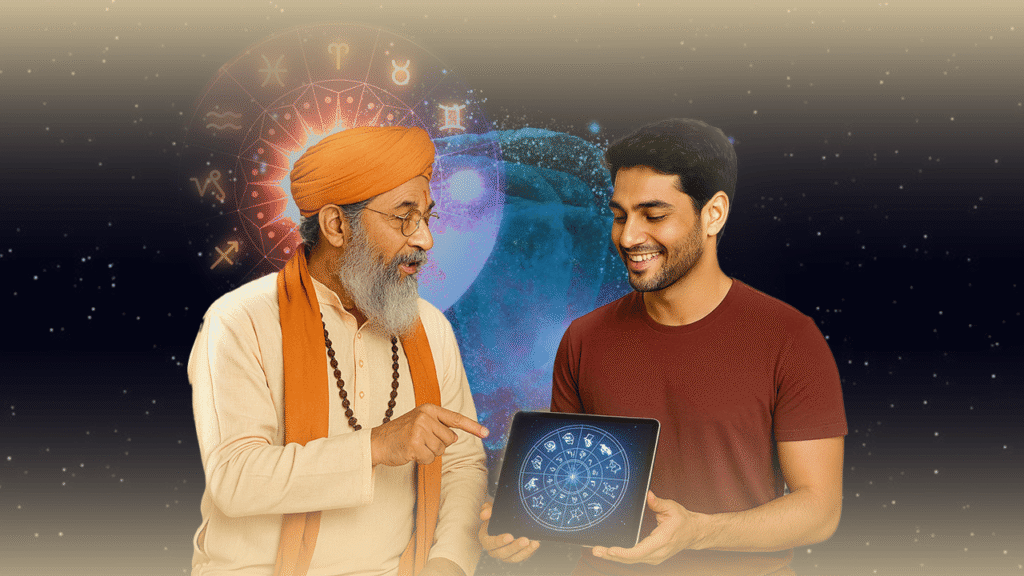
The Human Touch: Why Pandits Still Shine
For all its perks, AI lacks soul. Pandits don’t just predict—they counsel. They sense your mood, adjust their words, and sometimes throw in a life lesson or two. “My pandit once told me to trust my gut over his chart,” says Vikram, a 35-year-old from Delhi. “That’s not something an app can do.” In a world of screens, this human connection is gold.
Pandits also carry cultural weight. In Lucknow or Madurai, they’re community pillars, not just service providers. Apps can’t replace that trust—yet.
The Dark Side: Ethics and Exploitation
Both sides have flaws. Pandits aren’t perfect—some push pricey remedies (₹10,000 for a gemstone, anyone?) or prey on the vulnerable. Apps aren’t saints either. With data privacy laws still shaky in India, your birth details could end up with advertisers. “I got ads for lucky charms after using an app,” Riya admits. “It’s creepy.” The trade-off? Pandits rely on faith; apps, on your data.
The Future: A Cosmic Collaboration?
Maybe it’s not about choosing sides. What if pandits and AI teamed up? Imagine a pandit using an app to crunch planetary positions, freeing him to focus on counseling. Or apps like AstroSage, which already offers a “chat with a pandit” feature, blending tech with tradition. “AI can handle the math,” says Dr. Anjali Sharma, a data scientist and astrology buff. “Pandits can bring the heart.”
The market agrees. Astrology startups are booming, and by 2025, horoscope prediction trends could see AI and pandits sharing the stage. For Gen Z, apps might be their first cosmic brush, while their grandparents stick to the pandit’s word. Why not both? A hybrid approach could marry the wisdom of tradition with the convenience of technology.
Globally, AI astrology is trending too—apps like Co-Star are huge in the West. With India’s Vedic edge, we could lead this spiritual tech boom, exporting cosmic algorithms worldwide.
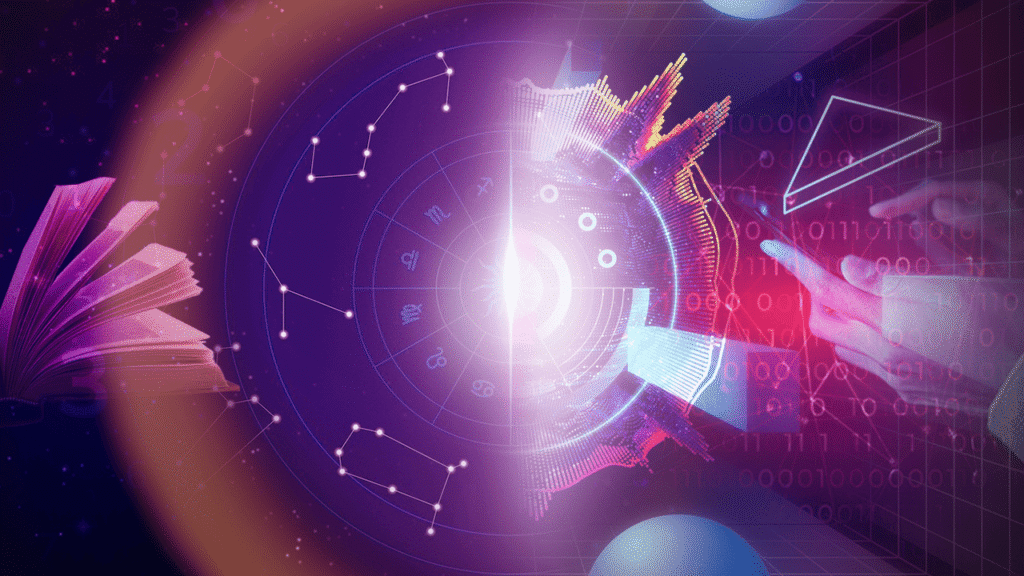
Conclusion: Your Stars, Your Choice
So, who wins—pandits or AI? Neither’s foolproof—life’s too messy for that. Pandits nurture your soul; AI crunches the numbers. I’ve tried both: my pandit’s warmth felt like a hug, the app’s insights like a quick nudge. Maybe the answer’s in the mix. In an uncertain world, astrology—however it comes—offers a glimmer of guidance. The universe might just surprise us yet.
What’s your take? Are you team pandit or team pixel? Share your cosmic tales below—let’s see who’s charting your stars!
You May Like This
Advertisement

You May Like This








Advertisement
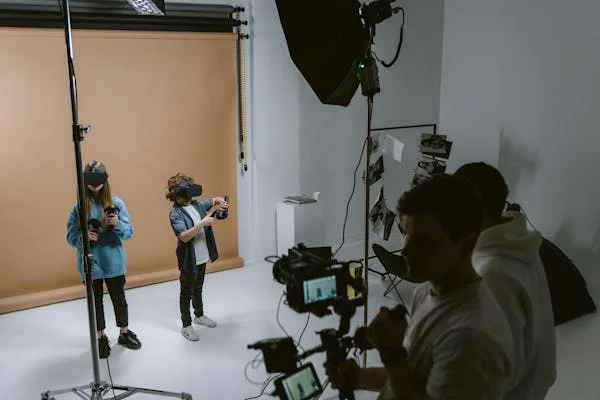
Advertisement

Advertisement





